新编英语教程 6 Unit 10 教案
新编英语语法教程(第6版)第10讲练习参考答案
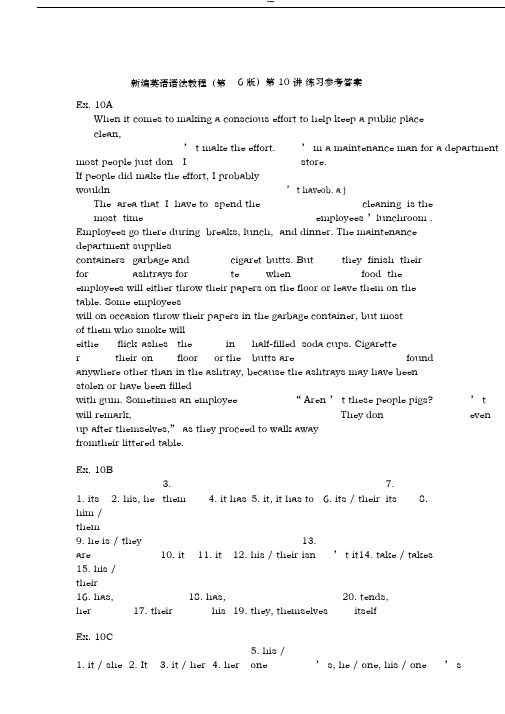
新编英语语法教程(第 6 版)第 10 讲练习参考答案Ex. 10AWhen it comes to making a conscious effort to help keep a public place clean,most people just don ’ t make the effort.I’ m a maintenance man for a departmentstore.If people did make the effort, I probablywouldn ’ t haveob. a jThe area that I have to spend the most timecleaning is the employees ’lunchroom .Employees go there during breaks, lunch, and dinner. The maintenance department suppliescontainers for garbage andashtrays forcigarettebutts. Butwhenthey finish theirfood theemployees will either throw their papers on the floor or leave them on the table. Some employeeswill on occasion throw their papers in the garbage container, but mostof them who smoke willeithe r flicktheirashesonthefloor orinthehalf-filled soda cups. Cigarettebutts are foundanywhere other than in the ashtray, because the ashtrays may have been stolen or have been filledwith gum. Sometimes an employee will remark, “ Aren ’ t these people pigs?They don’ tevenup after themselves,” as they proceed to walk away fromtheir littered table.Ex. 10B1. its2. his, he3.them 4. it has 5. it, it has to 6. its / their7.its8.him / them9. he is / theyare 10. it 11. it 12. his / their 13.isn’ t it14. take / takes15. his / their16. has,her 17. their 18. has,his 19. they, themselves20. tends,itselfEx. 10C1. it / she2. It3. it / her4. her5. his /one ’ s, he / one, his / one ’ s6. himself7.she8. it /she9. he / he or she, he / he orshe10. it /she11. it / she 12. his / his or her, his / his orher13. it /him14. it / him, it /he15. It16. he / he or she 17. his /her 18. it / she19. he / he orshe 20. he / he orshe, he / he or sheEx 10D1.me 2.me 3.she 4.me 5.her6.she7.whom8.who9.who10.whoever11.him12.its 13.anyoneelse ’ s 14.his15.who16.whoever 17.his18.her19.whom, her 20.whom。
新编英语教程(第三版)第一册第六课课件
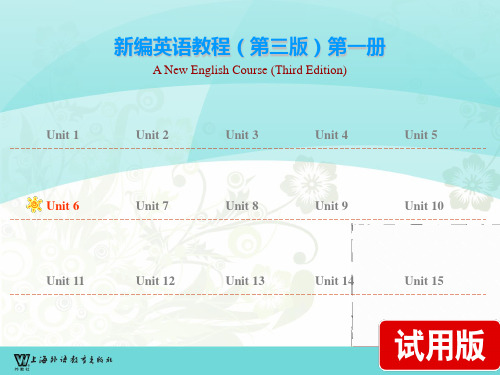
If two call you a donkey, check for hoof prints. If three call
us.
新编英语教程(第三版)第一册
Unit 6 Save Our Pandas Lead-In LSP Dialogue Role Play Reading Exercises
gross: (infml) very unpleasant to look at or think about e.g.: Ooh, gross! I hate spinach!
wet my fur: urinate on my fur 尿湿身上
新编英语教程(第三版)第一册
Unit 6 Save Our Pandas Lead-In LSP Dialogue Role Play Reading Exercises
humiliation: a feeling of shame and great embarrassment, because you have been made to look stupid or weak 羞辱 e.g.: She faced the humiliation of discussing her husband’s
新编英语教程(第三版)第一册
A New English Course (Third Edit 3
Unit 4
Unit 5
Unit 6
Unit 7
Unit 8
Unit 9
Unit 10
Unit 11
Unit 12
Unit 13
Unit 14
Unit 15
Unit 6 Save Our Pandas Lead-In LSP Dialogue Role Play Reading Exercises
新编英语教程第三版第5册Unit6-10重点词汇短语语言点

新编英语教程第三版第5册Unit6-10重点词汇短语语言点Unit61.Join in a symposium on sth./be included on the program参加一个有关...的研讨会2.Symposium seminar conference convention注意区分3.anchorman新闻节目主播4.Distinguished extinguish distinct distinctive instinct extinct5.To the core彻底地道的6.Aggressive progress progression regress digress7.Savvy:well-informed and perceptive:shrewd精明能干的有见识的8.Solid:definitely good and steady but perhaps not excellent or special相当不错的(但谈不上特别或出色的)9.In the ways and means在各方面10.,as i understand it,我认为11.Scrutinize:to observe or examine with great care~the diamond for flaws仔细察看钻石有无瑕疵12.Address a question to sb.提出问题13.Colleague college collage14.Prone be prone to...有。
倾向的15.Distortion歪曲扭曲事实的陈述16.React as though+从句17.Be blamed for/scold fault condemn因...而受到责难18.Deal with有关关于this is a book dealing with sth.19.Downside n.负面消极面20.At most至多;最迟21.Be apt to22.Sniper狙击兵23.Devalue贬值=devaluate24.Solely完全单独独自25.Collide with与...相撞26.Misshapen畸形的27.Catastrophe:a sudden event that causes many people to suffer灾难;灾祸;横祸28.Change for the better29.Underinformed&overinformed了解不足&知之甚多30.In turn转而31.Defeatism:an attitude to expect not to succeed32.Inhibitor抑制剂抑制者33.An unrelieved diet of=all coverage of比喻意多得令人生厌的事物Unrelieved:(formal)(of an unpleasant situation令人不快的情况)continuing without changing 持续不变的;未缓和的34.Deplete使空虚使消耗~sth of sthSurely it is an economic nonsense to deplete the world of natural resources.耗尽世界的自然资源毋庸置疑是愚蠢的经济行为。
新标准大学英语综合教程Book-Unit10教案
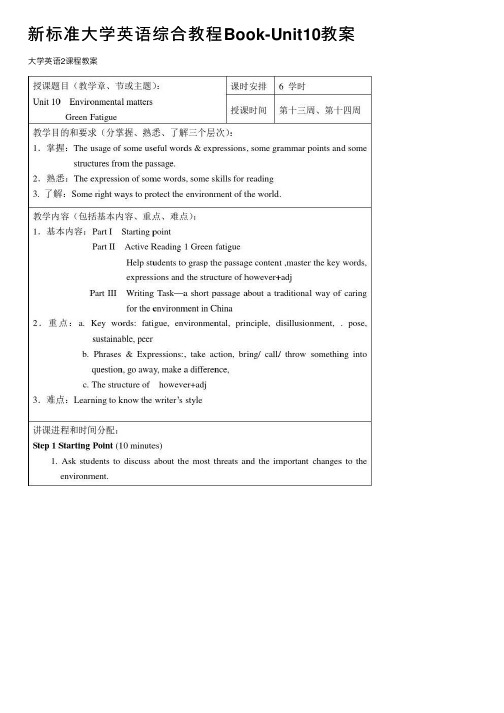
新标准⼤学英语综合教程Book-Unit10教案⼤学英语2课程教案Unit 10 Green FatigueTeaching Content:Green FatigueLesson Type: Intensive Reading (New Standard College English Book 1)Total Time: 4.5 HoursClass/Object : Freshman (the Second term)Teaching Procedures:Step 1Starting Point(10mins)Group discussion: What is the most important threats and changes to the environment. Free talking: What will you do for protecting the environment?Step 2Reading Task1.Introductory remarks (10mins)1) Background information:Since at least the 1970s people have been aware of environmental issues, but in recent years widespread concern has focused more on climate change and global warming. Climate change is one result of global warming, and has serious potential consequences. It could cause ice caps to melt, which would lead to a rise in sea levels, which in turn could endanger coastal cities. Climate change could also cause increases in droughts, floods, storms and cyclones, which couldaffect water supplies and lead to an increase in deserts and a decrease in harvests, and thus food shortages. So environmental awareness is important for everyone.2)Environmental awarenessIt means that people are aware of their impact on the environment. This includes an awareness of major environmental issues, such as climate change, global warming, pollution, recycling and energy-saving, and the role of people in them. Environmentally-aware people have some knowledge of possible solutions and make commitment to practical action towards solutions. This commitment is often called “green”. If businesses use a green label, they try to show that they support the protection of the environment. The meaning of environmental awareness has become broader as people have come to understand the complexity of environmental problems and the impact of people on the environment3) carbon footprintThe carbon footprint is a measure of the direct contribution of carbon from energy use. The element carbon is added to the earth’s atmosphere by the use of energy in lighting,heating or cooling houses, cooking, driving cars, flying planes and other human activities. This has an impact on the environment and affects climate change because it adds to greenhouse gases which contribute to global warming. Indirect carbon emissions from manufacturing and transport also create a carbon footprint. By measuring the carbon footprint we can get an idea of what each of us contributes to the climate change and what effect our actions may have on lowering the footprint, or reducing carbon emissions.Step 3 Comprehending the text (15mins)1. Do exercise 1(on page 16) before reading the text.2. Do exercise 2(on page 18) and exercise 6(on page 19) after reading the text asquickly as possible.Step 4 Language Points and Difficult Sentences (130mins)Language Points1. fatigue n. [U] the feeling that you have done a particular activity for so long that youno longer want to do it (长期做某事引起的)疲劳,疲倦e.g.1) Driver fatigue was to blame for the accident.这个事故是驾驶员疲劳所致。
新编英语教程 6 unit 10

1. You must focus your attention on what your customers need so that you are able to tell what is necessary and from what is unnecessary when you replenish your stock.(37-41) 2. The shop assistants had better have in stock what our customers need, or we won’t be in business long.(ll.34-35)
4. He reads gibberish, and gradually he forms a habit of writing gibberish himself, which he has been instructed to learn as exemplary writing of sophisticated taste. (ll.46-47)
Unit Ten Straight-A Illiteracy 1.Plight: situation; condition 2.As often as not:frequently; at least half the time 3.Articulate: having faculty with words, using language easily and fluently 4.A coveted fellowship: a fellowship (i.e., the money given to postgraduate students to allow them to continue their studies at advanced level) that
新编英语教程(第三版)第3册电子教案
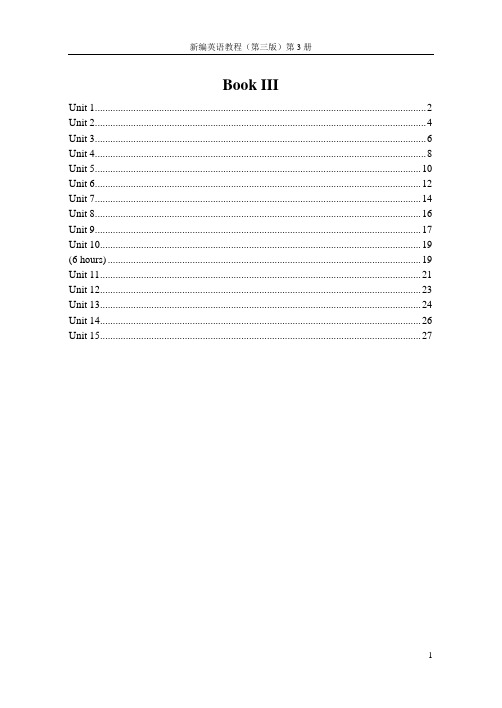
Book IIIUnit 1 (2)Unit 2 (4)Unit 3 (6)Unit 4 (8)Unit 5 (10)Unit 6 (12)Unit 7 (14)Unit 8 (16)Unit 9 (17)Unit 10 (19)(6 hours) (19)Unit 11 (21)Unit 12 (23)Unit 13 (24)Unit 14 (26)Unit 15 (27)Unit 1(6 hours)I. Teaching Aims:In this unit students are required to:1.Practice reading strategies such as predicting, skimming, guessing, etc.2.Grasp some new words and expressions to enrich student’s vocabulary;3.Do some oral work such as pre-reading questions, role play and interactionactivities to h elp to develop the students’ oral communicative abilities;4.Appreciate the two narrations in this unit and learn some writing skills in narrationand practice it along with letter writing;5.Do some other after-class exercise including listening and translation to improvestudents’ comprehensive skills.II. Teaching Emphasis:1. The comprehension and appreciation of Text I;2. New words and expressions:Awkward; dreary; rotund; grunt; proceed; dismay; appall; diffidently; singularly;reckon; querulous; somber; scribble; attach importance to; have sth. in common; a crocodile ofIII. Teaching Procedures: (4 hours)1.Greeting;2.The whole plan for this semester;3.Begin the new lesson:1). Answer the pre-reading questions orally;2).Allow students 3 minutes to go over text I rapidly for the main idea;3). Do the guesswork of vocabulary;4). Study Text I intensively;5). Answer the questions of Text I both in SB (student’s book) and B(workbook)orally;6). Listen to the tape and study Text II extensively to enlarge their vocabulary andwiden the scope of their knowledge;7). Do oral work;8).Study the main points of guided writing, including theinformation about précis writing, paragraph writing of narration and description, and the heading and salutation of a letter;9). Homework, finish all the exercise both in SB and WB.IV. Language points for Text I1…. With no experience of teaching my chances of landing the job were slim: there is little possibility for me to get the jobchances of doing sth.land: succeed in getting sth.E.g. His chance/chances of landing the1st prize is/are slim/scant/slender/small.2. summon sb. to do sth.3. …smell unpleasantly of stale cabbagesmell of: give out the smell of scent ofE.g. smell of brandy/paint/garlicHis accounts seemed to me smell of truth.4. proceed to (do) sth.: go ahead, continue to doprecede: come, go or happen just before sth. precede sth (with sth)E.g. proceed to announce his plan;proceed to the next item on the agenda;He preceded his speech with a warning against inattention.5. attach importance to sth.; consider… importantE.g. attach much importance/weight/significance to the theory6. have sth. in common7. not so much…but the fact that…E.g. It was not so much there being no councils of workers, peasants and soldiersworthy of the mane, but the fact that they were very few.8. the last straw: an addition to a set of troubles which makes one unbearableE.g. The hotel was expensive, the food poor, and bad weather was the last straw. V. Language points for Text II1.prompt sb. to do sth or prompt sth: urge or causeE.g. His action was prompted by fear.Hunger prompted him to steal.2. Feeling anything but well.: feeling far from being wellanything but (恰恰不,才不) nothing/nobody but (正是,只是)all but(几乎,差一点)E.g. She looks anything but well. ( She looks ill.)You have nobody but yourself to blame.The thief has all but succeeded in escaping.3. be set on/upon (doing) sth: be determined to do, make up one’s mind4. get round to doing sth.: find time to do sth. at lastE.g. After a long delay, he got around to writing the letter.5. instill sth. in/into sbinstill: to put (ideas feelings, etc.) gradually but firmly into someone’s mind by a continuous effortE.g. instill the idea of discipline and obedience into new soldiers6. It was more a cross-examination than an interview.7. In due course, you will hear from us.Due: right and properE.g. He has his due reward.Unit 2(6 hours)I. Teaching Aims:In this unit students are required to:1.Practice reading strategies such as predicting, skimming, guessing, etc.2.Grasp some new words and expressions to enrich student’s vocabulary;3.Do some oral work such as pre-reading questions, role play and interactionactivities to help to develop the students’ oral communicative abilities;4.Appreciate and learn some writing skills in the description of Text I and practice italong with letter writing;5.Get to know some information about April Fool’s Day;6.Do some other after-class exercise including listening and translation to improvestudents’ comprehensive skills.II. Teaching Emphasis:1. The comprehension and appreciation of Text I;2. New words and expressions:weep, rage, accordingly, croaking, cling, dismissive, brutal, quarantine, coop, witty, exempt, hoax, growl, preyIII. Teaching Procedures: (4 hours)1.Review the main points in last class;2.Study the new unit:1)Answer the pre-reading questions orally;2)Allow students 4 minutes to go over text I rapidly for the main idea;3)Do the guesswork of vocabulary;4)Study Text I intensively;5)Answer the questions of Text I both in SB(student’s book) andWB(workbook) orally;6)Listen to the tape and study Text II extensively to enlarge their vocabularyand widen the scope of their knowledge;7)Do oral work;8)Study the main points of guided writing, including how to write a paragraphof description, and the introduction of a letter;9)Homework, finish all the exercise both in SB and WB.IV. Language points for Text I1.He looked his goodbye at the garden.: He said his goodbye by looking at thegarden.2.cling toE.g. She still clings to the belief that her husband is alive.Little babies usually cling to their mothers.3.prepare sb/oneself for sth : make someone/oneself ready to accept or to beadjusted to a new condition, idea, or an event4.at such short notice: with little time for preparationE.g. The students usually give the landlady one month’s notice before they move.One can always get a taxi here at a short notice/at a moment’s notice.5.If only: is often used to introduce an exclamation expressing an unfulfilledcondition at present, in the past or in the future. The verb is generally in the past or past perfect.E.g. If only I had a chance to live my childhood once again.If only he had had a lot in common with me.6.would rather do sth than do sthE.g. I’d rather walk all these stairs up than wait for the lift to go up.7.be cooped upE.g. he felt good in the fresh air after being cooped up in the house for so long. V. Language points for Text II1.hoax: deceive, play tricks on sbhoax sb with sth, hoax sb into doing sthcoax: get sb to do sth by kindness or patiencecoax sb to do sth, coax sb into/out of doing sth2.needless to say3.prey: an animal that is hunted and eaten by another animal or by a person;someone who can easily be deceived or influencedE.g. Some salesman consider young housewives easy prey.4.exempt: free from a duty or service exempt…fromE.g. A doctor’s note will exempt you from physical education.VI. Some information about April Fool’s DayApril Fool’s Day is on April 1st. It is traditionally a day to play practical jokes on others, send people on fool's errands, and fool the unsuspecting. No one knows how this holiday began but it was thought to have originated in France.The closest point in time that can be identified as the beginning of this tradition was in 1582, in France. New Year's was celebrated on March 25 and celebrations lasted until April 1st. When New Year's Day was changed from March 25 to January 1st in the mid-1560's by King Charles IX, there were some people who still celebrated it on April 1st and those people were called April Fools.Pranks performed on April Fool's Day range from the simple, (such as saying, "Your shoe's untied!), to the elaborate. Setting a roommate's alarm clock back an hour is a common gag. The news media even gets involved. For instance, a British short film once shown on April Fool's Day was a fairly detailed documentary about "spaghetti farmers" and how they harvest their crop from the spaghetti trees.Whatever the prank, the trickster usually ends it by yelling to his victim, "April Fool!"April Fool's Day is a "for-fun-only" observance. Nobody is expected to buy gifts or to take their "significant other" out to eat in a fancy restaurant. Nobody gets off work or school. It's simply a fun little holiday, but a holiday on which one must remain forever vigilant, for he may be the next April Fool!Each country celebrates April Fool's differently. In France, the April Fool's is called "April Fish" (Poisson d'Avril). The French fool their friends by taping a paper fish to their friends' backs and when some discovers a this trick, they yell "Poisson d'Avril!". In England, tricks can be played only in the morning. If a trick is played on you, you are a "noodle". In Scotland, April Fools Day is 48 hours long and you are called an "April Gowk", which is another name for a cuckoo bird. The second day in Scotland's April Fool's is called Taily Day and is dedicated to pranks involving the buttocks. Taily Day's gift to posterior posterity is the still-hilarious "Kick Me" sign.Unit 3(6 hours)I. Teaching Aims:In this unit students are required to:1.Practice reading strategies such as predicting, skimming, guessing, etc.2.Grasp some new words and expressions to enrich student’s vocabulary;3.Do some oral work such as pre-reading questions, role play and interactionactivities to help to develop the students’ oral communicative abilities;4.Appreciate and learn some writing skills in the narration of Text I and practice italong with letter writing;5.Get to know some information about Bermuda Triangle;6.Do some other after-class exercise including listening and translation to improvestudents’ comprehensive s kills.II. Teaching Emphasis:1. The comprehension and appreciation of Text I;2. New words and expressions:consent, bid goodbye to, coincidence, feebly, naval, terminal, clarification, incredible, inheritance, wreckage, literally, snatch, overdueIII. Teaching Procedures: (4 hours)1. Review the main points in last class;2. Study the new unit:1)Do the pre-reading questions;2)Allow students 5 minutes to read the text rapidly for the main idea;3)Do the guesswork of vocabulary;4)Study Text I intensively;5)Answe r the questions of Text I both in SB(student’s book) and WB(workbook)orally;6)Listen to the tape and study Text II extensively to enlarge their vocabulary andwiden the scope of their knowledge;7)Do oral work;8)Study the main points of guided writing, including narration in chronologicalorder, and purpose of a letter;9)Homework, finish all the exercise both in SB and WB.IV. Language points for Text I1.consent: agreement or permission (v. n.)consent to sth.E.g. The young couple won/obtain/had their parent s’consent to theirmarriage.Shakespeare is, by common consent(公认), the greatest Englishdramatist.Her father reluctantly consented to the marriage.2.bid goodbye to sb.3.make some/a/no differenceE.g. A little perseverance makes a big difference between failure and success.It doesn’t make any difference to me which side will win or lose.4.find one’s voice5.purple with angergreen with envyash-white with terror6.My watch gains/loses a minute every day.V. Language points for Text II1.refer to sth as sth2.literally: really, without exaggeration; word for word, strictlyE.g. The children were literally starving.translate literally; carry out orders too literally3.vanish into thin air: disappear completely4.contribute to: help to cause sthE.g. Plenty of fresh air contributes to good health.Unit 4(6 hours)I. Teaching Aims:In this unit students are required to:1.Practice reading strategies such as predicting, skimming, guessing, etc.2.Grasp some new words and expressions to enrich student’s vocabulary;3.Do some oral work such as pre-reading questions, role play and interactionactivities to help to develop the students’ oral communicative abilities;4.Learn some writing skills in narration and letter writing;5.Get to know more information about William Shakespeare;6.Do some other after-class exercise including listening and translation toimprove students’ comprehensive skills.II. Teaching Emphasis:1. The comprehension and appreciation of Text I;2. New words and expressions:legacy, estate, genius, baptize, in a flash, influential, sufficiently, conviction, apprentice, set foot on the road to, presume, tempest, brilliantIII. Teaching Procedures: (4 hours)1. Review the main points in last class;2. Study the new unit:1) Answer the pre-reading questions orally;2) Allow students 4 minutes for rapid reading and 10 minutes for writing down themain idea for each paragraph;3)Do the guesswork of vocabulary;4)Study Text I intensively;5)Answer the questions of Text I both in SB(student’s book) and WB(workbook) orally;6)Listen to the tape and study Text II extensively to enlarge their vocabulary and widen the scope of their knowledge;7)Do oral work;8)Study the main points of guided writing, including the narration in chronological order and conclusion and ending of a letter;9)Homework, finish all the exercise both in SB and WB.IV. Language points for Text I1. be comfortably/well /better/best/badly/worse/worst off2. amount to: add up to, reach; be equal in meaning, be the same asE.g. Our monthly expenditure on food usually amounts to 150 yuan.Her reply amounts refusal.You won’t amount to anything if you idle your time away like this.3.literary: typical of literatureE.g. literary works; literary styleliteral: being or following the exact or original meaning of a wordE.g. literal meaning ←→figurative meaningliteral translation ←→free translationliterate: able to read and write4.conviction: the feeling of being sure about sthE.g. It’s my conviction that our team will win the game.convict: declare sb is guiltyconvict sb. of sth5.realize in a flashV. Language points for Text II1.be apprenticed to2.set foot on the road to sthVI. More Information on William ShakespeareOne of the greatest giants of the Renaissance, Shakespeare holds, by general acclamation, the foremost place in the worl d’s literature. His close friend, the playwright Ben Johnson, said of him that he was “not of an age, but for all time.”His works are a great landmark in the history of world literature for he was one ofthe first founders of realism, a master hand at realistic portrayal of human characters and relations.Shakespeare’s complete works include 37 plays, 2 narrative poems and 154 sonnets. Some of his best known plays are:The Taming of the ShrewRomeo and Juliet,A Midsummer Night’s DreamThe Merchant of VeniceMuch Ado about Nothing,Twelfth NightAll’s Well that Ends Well, HamletOthelloKing LearMacbethTimon of AthensMeasure for MeasureThe TempestUnit 5(6 hours)I. Teaching Aims:In this unit students are required to:1.Practice reading strategies such as predicting, skimming, guessing, etc.2.Grasp some new words and expressions to enrich student’s vocabulary;3.Do some oral work such as pre-reading questions, role play and interactionactivities to help to develop the students’ oral communica tive abilities;4.Get to know the organization of a feature report and learn some writing skills innarration and practice it along with letter writing;5.Do some other after-class exercise including listening and translation to improvestudents’ comprehensive skills.II. Teaching Emphasis:1. The comprehension and appreciation of Text I;2. New words and expressions:lobby, complexion, foreboding, shudder, scheme, psyche, moat, breach, in progress, screech, quirk, chic, grunge, reverie, scramble, lopsided, executive, distressing, badger, have the nerve to do sthIII. Teaching Procedures: (4 hours)1. Review the main points in last class;2. Study the new unit:1) Read the information of the text on p.54, 55 to get a better understanding ofChunnel;2) Answer the pre-reading questions orally;3) allow students 5 minutes to read the text rapidly for the main idea;4) do the guesswork of vocabulary;5) Study Text I intensively;6) Answer the questions of Text I both in SB(student’s book) and WB(work book)orally;7) Listen to the tape and study Text II extensively to enlarge their vocabulary andwiden the scope of their knowledge;8) do oral work;9) Study the main points of guided writing, mainly paragraph writing ofnarration in informal tone, and letter writing to ask for information;10) Homework, finish all the exercise both in SB and WB.IV. Language points for Text I1.…stiff upper lips trembled: here stiff upper lips stands for Englishman. It’smetonymy.(换喻,转喻)(keep) a stiff upper lip: (show) an ability to appear calm and unworried whenin pain or troubleE.g. The general praised the boys for keeping a stiff upper lip in time oftrouble.2. A tiny explosion of air from pursed lips.purse up one’s lips: draw one’s lips together esp. as a sign o f disapproval3.by the grace of God: due to, thanks toE.g. By the grace of God the children were rescued by the fireman.pound adjectives made up in various ways:the soon-to-be-opened Chunnelthe gull-wing eyebrowscross-Channel-link schemestungsten-tipped teethV. Language points for Text II1.alternative: adj. OtherE.g. Have you got an alternative suggestion?n. choice of twoE.g. Caught in the act, he had no alternative but to confess.alternate: adj. A. (of two things) happening or following one after the otherE.g. alternate triumph and despairB. every second e.g. on alternate daysv. cause to occur one after the otherE.g. Most farmers alternate their crops.2.It’s a matter of choice, not nerves.nerve: couragehave the/no nerve to do sth or lose one’s nerveUnit 6(6 hours)I. Teaching Aims:In this unit students are required to:1.Practice reading strategies such as predicting, skimming, guessing, etc.2.Grasp some new words and expressions to enrich student’s vocabulary;3.Do some oral work such as pre-reading questions, role play and interactionactivities to help to develop the students’ oral communicative abilities;4.Appreciate the two arguments in this unit and learn some writing skills andpractice it along with letter writing;5.Do some other after-class exercise including listening and translation to improvestudents’ comprehensive skills.II. Teaching Emphasis:1. The comprehension and appreciation of Text I;2. New words and expressions:refuel, outlay, harness, bonnet, conquer, radiation, penetrate, synthetic, extinction, rivet, in a panic, opposition, scrap, evacuation, arsenal, scornIII. Teaching Procedures: (4 hours)1. Review the main points in last class;2. Study the new unit:1)Answer the pre-reading questions orally;2)Allow students 3 minutes to read the text rapidly for the main idea;3)Do the guesswork of vocabulary;4)Study Text I intensively;5)Answer the questions of Text I both in SB(student’s book) and WB(workbook)orally;6)Listen to the tape and study Text II extensively to enlarge their vocabulary andwiden the scope of their knowledge;7)Do oral work;8)Study the main points of guided writing, mainly about the paragraph writing ofargument, and the letter writing to ask a favor;9)Homework, finish all the exercise both in SB and WB.IV. Language points for Text I1.dream of sth or doing sth2.Harness atomic power in a car, and you’ll have no more worries about petrol.╱or you’ll do…= If …not…you’ll…Imperative sentence,╲and you’ll do…= If … you’ll…E.g. Practice speaking English more, and you’ll improve your oral Englishquickly.Be careful in your pronunciation, or you’ll have great trouble in listeningand speaking.3.outlay: a spending of moneyoutlay on sth.E.g. the weekly outlay on groceries;a considerable outlay on basic researchOur country has outlaid (v.) a large sum of money in capital construction.4.economy: A. economic situation B. thrift and frugalityE.g. The economy of the country is changing from bad to worse.We are better off now, but we still have to practice economy.economic: having to do with economicsE.g. Economic crises are sure to occur in the capitalist world from time to time.economical: thrifty, not wasting money or timeE.g. The writer is famous for his economical style.5.be well on the way toE.g. We were well on the way to the age of knowledge-based economy.V. Language points for Text II1.pour scorn on sb/sthhold /think it scorn to do sthy out: displayE.g. lay out merchandise3.in a panicUnit 7(6 hours)I. Teaching Aims:In this unit students are required to:1.Practice reading strategies such as predicting, skimming, guessing, etc.2.Grasp some new words and expressions to enrich student’s vocabulary;3.Do some oral work such as pre-reading questions, role play and interactionactivities to help to develop the students’ oral communicative abilities;4.Appreciate the two arguments in this unit and learn some writing skills andpractice it along with letter writing;5.Do some other after-class exercise including listening and translation to improvestudents’ comprehensive skills.II. Teaching Emphasis:1. The comprehension and appreciation of Text I;2. New words and expressions:pose, suspense, irritate, asphyxiated, ventilate, fidget, indiscreet, chatterbox, elope, obstinacy, willfulness, escapism, justify, tycoon, aptitude, stumble, for a start, turn a deaf ear to, ex-directoryIII. Teaching Procedures: (4 hours)1. Review the main points in last class;2. Study the new unit:1)Answer the pre-reading questions orally;2)Allow students 3.5 minutes to go over the text rapidly for the main idea;3)Do the guesswork of vocabulary;4)Study Text I intensively;5)Answer the questions of Text I both in SB(student’s book) and WB(workbook)orally;6)Listen to the tape and study Text II extensively to enlarge their vocabularyand widen the scope of their knowledge;7)Do oral work;8)Study the main points of guided writing, mainly about the paragraph writingof argument, and the letter writing to make an offer;9) Homework, finish all the exercise both in SB and WB.IV. Language points for Text I1. take sth. for granted or take it for granted that: believe sth. withoutthinking about it very much2. He is proposing to attempt the impossible…: When he intends to do impossible…propose: have formed a plan; intendusage: propose to do sthpropose: suggestusage: propose doing sth./ that clause3.pose as unusual: pretend to beE.g. He posed as a learned man.She is always posing.pose for a photograph with sb.pose an obstacle to the development, allow me to pose a question4.suspense: anxiety or apprehension resulting from an uncertain, undecided ormysterious situationusage: in suspense, keep (sb) in suspense, hold in suspenseE.g. He waited in great suspense for the doctor’s opinion.suspension:E.g. the suspension of arms, suspension from school/officesuspicion:E.g. above suspicion, under suspicion5.justify: give a good reason forjustify sth or doing sthE.g. The editors are perfectly justified in refusing your work.6.have/ show an aptitude for sth.7.be bent on questioning you: be determined to question you.E.g. She is bent on becoming a good pianist.He is bent on making journalism his career.V. Language points for Text II1.for a start: to begin with, to start with2.…get away scot-free: escape without punishmentE.g. No student can get away with a breach of the rules of the university.got away from the restaurant scot-free3.turn a deaf ear to: ignore, pay no attention toE.g. I shall turn a deaf ear in future to all your empty promises.4.the people most plagued by…plague: pester or annoy persistently or incessantlyE.g. Runaway inflation further plagued the wage or salary earner.Unit 8(6 hours)I. Teaching Aims:In this unit students are required to:1.Practice reading strategies such as predicting, skimming, guessing, etc.2.Grasp some new words and expressions to enrich student’s vocabulary;3.Do some oral work such as pre-reading questions, role play and interactionactivities to help to develop the stu dents’ oral communicative abilities;4.Appreciate the two arguments in this unit and learn some writing skills andpractice it along with letter writing;5.Do some other after-class exercise including listening and translation to improvestudents’ comprehensiv e skills.II. Teaching Emphasis:1. The comprehension and appreciation of Text I;2. New words and expressions:shelter, end up with, engross, browsing, retire, indulgent, beckon, tell off, tuck, discreet, poverty-stricken, a nose for, persevere, flickIII. Teaching Procedures: (4 hours)1. Review the main points in last class;2. Study the new unit:1)Answer the pre-reading questions orally;2)Allow students 2 minutes for rapid reading and 5 minutes for writing the mainidea of each paragraph;3)Do the guesswork of vocabulary;4)Study Text I intensively;5)Answer the questions of Text I both in SB(student’s book) and WB(workbook)orally;6)Listen to the tape and study Text II extensively to enlarge their vocabularyand widen the scope of their knowledge;7)Do oral work;8)Study the main points of guided writing, including the paragraph writing ofpersuasive writing, and the letter writing as to make a suggestion;9)Homework, finish all the exercise both in SB and WB.IV. Language points for Text I1.shelter: cover and protectionfind/take shelter from; give shelter to; be a shelter from; under the shelter of2.be engrossed in: be absorbed in, be taken upE.g. The audience was completely engrossed by the actor’s performance.3.to one’s heart’s content: as much as one likeE.g. S he n ever dares to eat to her heart’s content for fear that she would put onweight.4.…the assistant should retire discreetly…retire: move back or awayE.g. retire to one’s room; retire to bed;retire from the service; retire from the world;5.Apart from running up a huge account.run up: make or become greater or largerE.g. run up a huge account/bill/debts6.indulge: yield to, gratifybe indulged inE.g. She is indulged in idle daydreams.7.beckon to sb or beckon sb to do sthE.g. He beckoned me to come nearer.8.tell sb off: scold or rebuke severelyE.g. The teacher told him off for not doing his homework.9. tuff away sth: put sth in a safe placeE.g. The troop was tucked away in a quiet valley.V. Language points for Text II1.be mean with sth2.poverty-stricken; panic-stricken; conscience-stricken; grief-stricken;fever-stricken3.It’s real a bargain.A bargain is a bargain.make a bargain with sb; bargain sth for sth4.has a nose for gossip/informationnose into other’s affairsKeep your big nose out of my affairs.Unit 9(6 hours)I. Teaching Aims:。
新编英语教程6教案
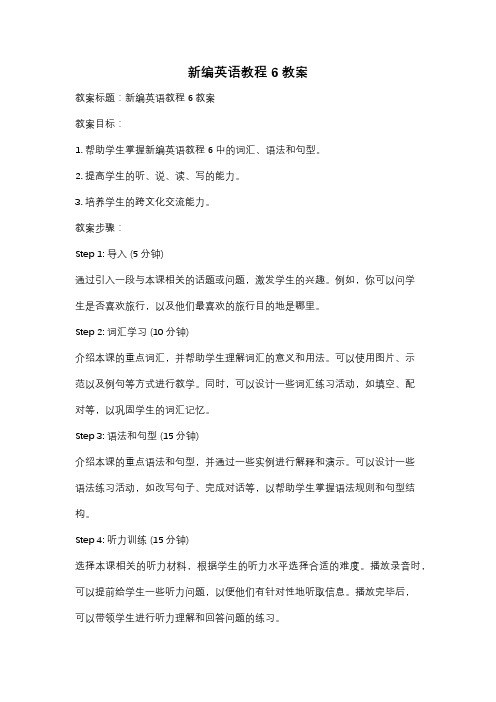
新编英语教程6教案教案标题:新编英语教程6教案教案目标:1. 帮助学生掌握新编英语教程6中的词汇、语法和句型。
2. 提高学生的听、说、读、写的能力。
3. 培养学生的跨文化交流能力。
教案步骤:Step 1: 导入 (5分钟)通过引入一段与本课相关的话题或问题,激发学生的兴趣。
例如,你可以问学生是否喜欢旅行,以及他们最喜欢的旅行目的地是哪里。
Step 2: 词汇学习 (10分钟)介绍本课的重点词汇,并帮助学生理解词汇的意义和用法。
可以使用图片、示范以及例句等方式进行教学。
同时,可以设计一些词汇练习活动,如填空、配对等,以巩固学生的词汇记忆。
Step 3: 语法和句型 (15分钟)介绍本课的重点语法和句型,并通过一些实例进行解释和演示。
可以设计一些语法练习活动,如改写句子、完成对话等,以帮助学生掌握语法规则和句型结构。
Step 4: 听力训练 (15分钟)选择本课相关的听力材料,根据学生的听力水平选择合适的难度。
播放录音时,可以提前给学生一些听力问题,以便他们有针对性地听取信息。
播放完毕后,可以带领学生进行听力理解和回答问题的练习。
Step 5: 口语练习 (15分钟)设计一些口语练习活动,如角色扮演、对话练习等,以帮助学生运用所学知识进行口语表达。
可以设置一些情景,让学生在真实的语境中进行口语练习,提高他们的口语流利度和交际能力。
Step 6: 阅读与写作 (15分钟)选择一篇适合学生阅读的文章,并设计一些阅读理解题目,以帮助学生理解文章内容。
同时,可以引导学生根据文章的内容进行写作练习,如写一篇关于旅行经历的短文或写一封感谢信等。
Step 7: 小结与反思 (5分钟)对本节课的学习内容进行小结,并向学生提供一些反思问题,让他们思考自己在本节课中的收获和不足之处。
同时,可以向学生征求他们对下节课的期望和建议。
以上是一个基本的教案框架,你可以根据具体的教学内容和学生的实际情况进行相应的调整和修改。
记得根据学生的学习特点和能力,合理安排教学活动,使学生在轻松愉快的氛围中积极参与,提高英语学习的兴趣和效果。
新编英语教程6教案Unit_Two
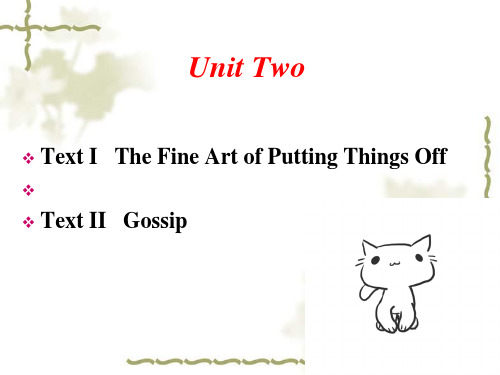
attest to: testify to; serve as an evidence to affirm / to be proof of 证明,表明 E.g.: His success attests to his ability. 他的成功 表明他有能力。 ever: (old use or in combination) always 总是, 不断地;永远,始终 E.g.: War and suffering have ever gone hand in hand. 战争和苦难总是结伴而行的。
Paragraph 7
churn out: produce something routinely or mechanically, especially in large quantities. check out the latest book: examine the latest book carefully; borrow the latest book from the library
plead: (formal) give as an excuse for an action 提出…为理由;提出…为借口 E.g.: The thief pleaded poverty. 那贼说是因为 贫穷才偷窃的。 edict: an order or command; decree procrastination: (formal) a repeated delay (without good reason) in doing some necessary act
dub: give (someone) an unofficial name or nickname 给…起绰号;把…称为;授予…称 号 E.g.: He was dubbed Shorty because of his size. 他因身材短小被人取了个矮子的绰号。
新编实用英语综合教程Unit 6 Faster,Higher and Stronger
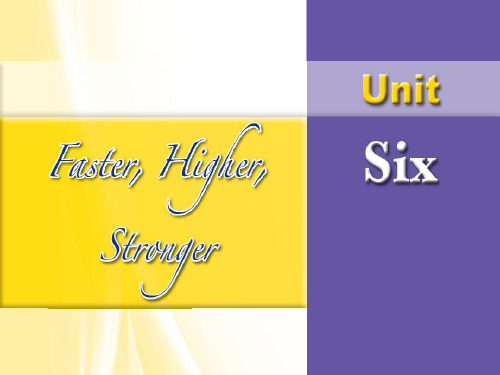
Back
Unit | Six
Following Sample Dialogues
4 Read the following sample dialogues and try to perform your own tasks.
Unit | Six
Back
Unit | Six
Putting Language to Use
A: There is a poster of a swimming contest at the school gate.
B: Great! I'll go and check the details .
细节
Unit | Six
Window on Key Words
3) Inviting One to an Outdoor Activity A: Our sstutuddeenntsts' 'uunnioionn will hold a ccyycclliinngg race this weekend around the city. B: Cycling? I love it. A: Would you like to come with us? B: Sure.
6 ___is__fr_e_e_______.
Mr. Power: Really? 7T_h_a_t_'s__w_o_n__d_e_rf_u_l___! Shall we go there together? Back
You: OK. See you at 6:30 at the school gate.
You: Sherry, what should we do this weekend? 1 (问她对什么娱乐活动感兴趣)
新编英语教程第6册教案Unit_Three

Paragraph 3
❖ E.g.: pick a stone up and heft it 捡起一块 石头掂一掂有多重
❖ hefty adj.: of considerate weight 沉重的
with money. 她倒不是穷而是太在乎钱了。
Paragraph 2
❖ Why do you think Raskin’s father and people of his generation take a negative attitude toward a bank with glass walls?
Paragraph 3
❖ a tangible commodity: a material thing, a substantial object
❖ bullion: gold or silver in bulk or bars, before it is made into coins, etc. 金或 银锭(条)
❖ E.g.: a flair for music 学习音乐的天分 ❖ be impressed by sb.’s political flair 对
某人的政治才干有深刻印象
❖ in view of: considering; taking into consideration
❖ heartily: in a cheerful way; here, completely and absolutely
II. Key Points of the Text
❖ Paragraph 2 ❖ unnerve: make someone lose self-control,
新编英语教程 unit 10

Listen out (for) infml to listen carefully, esp.for an expected sound 留心听:
留神着听小宝宝有没有醒来 Listen out for the baby in case she wakes up.
2.…he need not “copy” nature like the sculptor; A sculptor(雕刻家) is a person who uses wood,
in to the news.(收听新闻) B)listen in (on, to): to listen to the conversation
of other people,esp.secretly and without permission 偷听,窃听
I think the police have been listening in on my phone calls.
我看这些事实证明她的罪行没有什么可疑之处我看这些事实证明她的罪行没有什么可疑之处
From Composer to interpreter to listener
Paragraph 1-3 the composer
Para.1 : he (the composer) gives us himself
Para.2: sentence 1
Para. 3: It is the interreactions of personality and period that results in the formation of a composer’s style.
Discussion question
① embody (v.)—include, express clearly and definitely 具体表现,包括
新编英语教程unit_10共27页文档
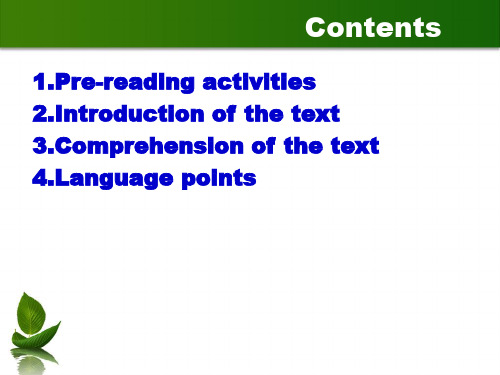
Spiritual music(原先由美国黑奴唱的)黑人圣歌, ballad 【音乐】 伤感的情歌:尤指浪漫的或伤感的流行歌曲, Swing music摇摆乐:形成于1935年前后的一种流行舞蹈音乐,以
爵士乐为基础,但运用更简单的和声和节奏形式以及更大的管乐队
美国黑人发展的流行音乐结合了福音唱诗以及强节奏音乐和布鲁斯音乐的特点?spiritualmusic原先由美国黑奴唱的黑人圣歌?ballad音乐伤感的情歌
Contents
1.Pre-reading activities 2.Introduction of the text prehension of the text nguage points
Aaron Copland (November 14, 1900 – December 2, 1990) was an American classical composer of concert and film music. Instrumental in forging a distinctly American style of composition, Copland's music achieved a difficult balance between modern music and American folk styles.
7.Mirror: v, reflect (sth) as in a mirror 反射,映照(某事物) Eg: The tress were mirrored in the still water of the lake. 静静的湖水映出岸上的树木。 A novel that mirrors modern society. 反映现实社会的小说
新编英语教程 6 Unit 10 教案
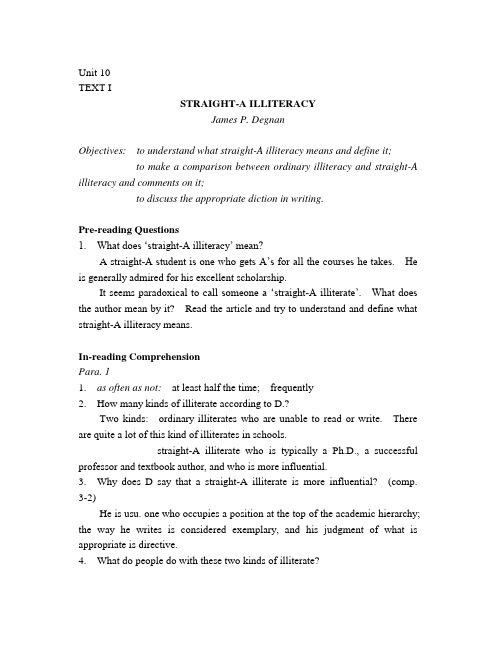
Unit 10TEXT ISTRAIGHT-A ILLITERACYJames P. DegnanObjectives: to understand what straight-A illiteracy means and define it;to make a comparison between ordinary illiteracy and straight-A illiteracy and comments on it;to discuss the appropriate diction in writing.Pre-reading Questions1. What does ‘straight-A illiteracy’ mean?A straight-A student is one who gets A’s for all the courses he takes. He is generally admired for his excellent scholarship.It seems paradoxi cal to call someone a ‘straight-A illiterate’. What does the author mean by it? Read the article and try to understand and define what straight-A illiteracy means.In-reading ComprehensionPara. 11. as often as not: at least half the time; frequently2. How many kinds of illiterate according to D.?Two kinds: ordinary illiterates who are unable to read or write. There are quite a lot of this kind of illiterates in schools.straight-A illiterate who is typically a Ph.D., a successful professor and textbook author, and who is more influential.3. Why does D say that a straight-A illiterate is more influential? (comp. 3-2)He is usu. one who occupies a position at the top of the academic hierarchy; the way he writes is considered exemplary, and his judgment of what is appropriate is directive.4. What do people do with these two kinds of illiterate?More concern has been shown for the ordinary illiterates. People even make fuss about this kind of illiteracy. However, little attention is aroused to straight-A illiterates. So, the purpose of this article is to give them as much attention as has been paid to ordinary illiterates. (ll. 6-7)Para. 21. What is this para. about?D’s treatment with a disease of straight-A illiteracy in his office.2. Do you think D’s comparison of straight-A illiteracy to a disease is appropriate? Explain. (comp. 3-3)Yes. Like a disease, it victimizes healthy persons; it has its symptoms, and its agents.3. Who is the straight-A illiterate?a college senior ... outstanding graduate schools.He is extremely clever and highly talented in language. He has done an excellent job in his studies, so he has been awarded an opportunity to further his study in one of the nation’s best graduate schools.4. How does the treatment go?They have been going over the student’s paper sentence by sentence, word by word for an hour, prying and probing for its meaning.‘Prying and probing’, the repetition of the same structure, is to emphasize the extreme difficulty of the task.5. Are there any other words to highlight the extreme difficulty in understanding Mr. Bright’s paper? (comp. 3-4)interrogating, cross-examining, pause to catch my breath, on earth, his brow furrowed, tries mightily, finally ... finally, another hour, decode ....6. Try to explain why the following pairs of sentences are the same in meaning: ll. 15-17, ll. 23 (comp. 3-8)As intended by the student, ‘The choice ... multi-colinearity’ corresponds to ‘demand’ while ‘... the derivations ... coefficients’ corresponds to ‘supply’.This is a very abstruse sentence to unravel.7. Why does D insert the word ‘allegorically’ in ‘... whom I call, allegorically,Mr. Bright’? (comp. 3-5)‘allegory’ in Lib. Work.When the author calls his student Mr. Bright allegorically, he does not mean to refer to this particular straight-A student only. He is using the term to cover all those students, college seniors, and Ph.D.’s who may seem bright when judged by their academic records, but who nevertheless fail to detect gibberish in their own writings or in those of others.The student given the name Mr. Bright thus becomes a symbol.Is he really bright? No, here in an ironical sense.Para. 31. It attacks best minds, ... in that of others.It does harm to the most intelligent individual and, by and by, wears away his ability to judge, eventually reducing him to being unable t Para. 3o detect nonsense either in his own writing or in that of others.This is the harm that straight-A illiteracy does to people.2. Reword the following sentences so that they are more easily understood: ll. 34-35, ll. 37-41 (comp. 3-9)ll. 34-35: The shop assistants had better have in stock what our customers need, or we won’t be in business long (=This is said or written by an ordinary illiterate, who is poor at spelling (them), pronunciation, punctuation, grammar (had + better, stock -up on, ain’t gonna be). So he makes many mistakes, and so he is kept out of institutions of higher learning. (l. 33)ll. 37-41: You must focus your attention on what your customers need so that you are able to tell what is necessary from what is unnecessary when you replenish your stock.This is written by a straight-A illiterate, who would never make spelling, grammar, punctuation mistakes, but who is incapable of making his ideas simple and clear in his writing. However, it is for writing this gibberish that he can be awarded straight As on his papers and the opportunity to continue his study, receiving higher and higher education until he has successfully got the Ph.D.The higher education one receives, the more serious his disease of straight-A illiteracy becomes. (ll. 27-28)3. Make complete the elliptical sentence ‘Not our man’. What is the function? (comp. 3-6)‘This is not what our man would say’. This ellipsis contrasts the two types of illiteracy, and with it D turns back from one type to the other.Para. 41. What is the major cause of straight-A illiteracy?the stuff - the textbooks and professional journals that the straight-A illiterate is forced to read during his years of higher education.He reads gibberish, and gradually he forms a habit of writing gibberish himself, which he has been instructed to learn an exemplary writing of sophisticated taste. (ll. 46-47)2. Give the examples of gibberish D quotes from professional journals.jargons as ‘ego-integrative action orientation’ and ‘orientation toward improvement of the graficational-deprivation balance of the actor’‘homologous’ or ‘isomorphic’, meaning ‘alike’‘allotropic’, meaning ‘different’‘dichotomize’ or ‘bifurcate’, meaning ‘divide anything3. D concludes his article by using quite a number of unintelligible words and expressions in place of clear and simple English. Is it effective? Why?This usual arrangement has undoubtedly enabled the reader once again to feel even more the absurdity of the practice to express simple ideas in an almost incomprehensible way, adding more weight to the point he intends to make. (Analysis)Post-reading Discussion1. Makeadefinition of ‘straight-A illiteracy’. (comp. 1-A)2. What is the purpose of D’s writing? (comp. 3-1)to find the cause of straight-A illiteracy.to give straight-A illiterate equal time with his widely publicizedcounterpart. (para. 1)to expose and condemn the use of professional jargon, which fills the reading materials that highly educated people are forced to read as they pursue their education. (Analysis)3. Comp. 24. Group work: Compare briefly the two types of illiteracy. Which type in your opinion presents a graver problem to society? (comp. 3-10)TEXT IITHE QUALITIES OF GOOD WRITINGJacqueline Berke1. This is an excerpt from Twenty Questions for the Writer, a widely used writing textbook, the kind of which we need to read to further our learning by ourselves. What do you usu. do when you read this kind of book by yourselves? Underline or highlight the important words or sentences, or make notes of your own so as to get the gist of it. Suppose you have borrowed this book from the library and come to read this part. What will you do with it? Study the text individually before class and do what you usu. do to catch the gist.2. Have group work for about 20 mins., exchanging what you have learned after reading it, and preparing for a presentation of this text. Your presentation can be based on Questions 1, 2, & 4 on p165.3. Presentation: Ask 4 groups to present the three qualities and human nature of writing respectively.4. As college seniors, we need to choose those more specific, exact, meaningful words in our writing rather than those common words as ‘good’, ‘nice’, etc. Do you consider using those more specific, exact, meaningful words as a kind of straight-A illiteracy? Give your opinions.。
人教版高中英语选修6,10教案大全(汇总)高中英语教学设计方案.doc

人教版高中英语选修6,10教案大全(汇总)高中英语教学设计方人教版高中英语选修6-10教案大全(汇总)人教版高中英语选修6《Unit1Art》教案人教版高中英语选修6《Unit 2Poems》教案人教版高中英语选修6《Unit 3Ahealthylife》教案人教版高中英语选修6《Unit 4Globalwarming》教案人教版高中英语选修6《Unit 5Thepowerofnature》教案人教版高中英语选修7《Unit 1Livingwell》教案人教版高中英语选修7《Unit 2Robots》教案人教版高中英语选修7《Unit 3Underthesea》教案人教版高中英语选修7《Unit 4Sharing》教案人教版高中英语选修7《Unit 5Travellingabroad》教案人教版高中英语选修8《Unit 1Alandofdiversity》教案人教版高中英语选修8《Unit 2Cloning》教案人教版高中英语选修8《Unit 3Inventorsandinventions》教案人教版高中英语选修8《Unit 4Pygmalion》教案人教版高中英语选修8《Unit 5Meetingyourancestors》教案人教版高中英语选修9《Unit 1Breakingrecords》教案人教版高中英语选修9《Unit 2Sailingtheoceans》教案3Australia》教案人教版高中英语选修9《Unit 4Exploringplanets》教案5Insideadvertising》教案人教版高中英语选修10《Unit 1Nothingventured》教案人教版高中英语选修10《Unit 2KingLear》教案人教版高中英语选修10《Unit 3Fairnessforall》教案高中教学计划小编推荐各科教学设计:语文、数学、英语、历史、地理、政治、化学、物理、生物、美术、音乐、体育、信息技术高中教学计划小编推荐各科教学设计:语文、数学、英语、历史、地理、政治、化学、物理、生物、美术、音乐、体育、信息技术人教版九年级上学期语文教学计划-计划【计划】一、学生基本情况分析:根据我校学生实际特点,以及语文学科特点和目前本学科发展方向的把握,结合我校“学有所长,优有特色”的办学方针,我们的语文教学最初以“指导方法,培养习惯,搭建舞台,陶冶性情”为口号和行动原则,加强了日常教学和学科活动的针对性和有效性,人教版九年级上学期语文教学计划。
- 1、下载文档前请自行甄别文档内容的完整性,平台不提供额外的编辑、内容补充、找答案等附加服务。
- 2、"仅部分预览"的文档,不可在线预览部分如存在完整性等问题,可反馈申请退款(可完整预览的文档不适用该条件!)。
- 3、如文档侵犯您的权益,请联系客服反馈,我们会尽快为您处理(人工客服工作时间:9:00-18:30)。
Unit 10TEXT ISTRAIGHT-A ILLITERACYJames P. DegnanObjectives: to understand what straight-A illiteracy means and define it;to make a comparison between ordinary illiteracy and straight-A illiteracy and comments on it;to discuss the appropriate diction in writing.Pre-reading Questions1. What does ‘straight-A illiteracy’ mean?A straight-A student is one who gets A’s for all the courses he takes. He is generally admired for his excellent scholarship.It seems paradoxi cal to call someone a ‘straight-A illiterate’. What does the author mean by it? Read the article and try to understand and define what straight-A illiteracy means.In-reading ComprehensionPara. 11. as often as not: at least half the time; frequently2. How many kinds of illiterate according to D.?Two kinds: ordinary illiterates who are unable to read or write. There are quite a lot of this kind of illiterates in schools.straight-A illiterate who is typically a Ph.D., a successful professor and textbook author, and who is more influential.3. Why does D say that a straight-A illiterate is more influential? (comp. 3-2)He is usu. one who occupies a position at the top of the academic hierarchy; the way he writes is considered exemplary, and his judgment of what is appropriate is directive.4. What do people do with these two kinds of illiterate?More concern has been shown for the ordinary illiterates. People even make fuss about this kind of illiteracy. However, little attention is aroused to straight-A illiterates. So, the purpose of this article is to give them as much attention as has been paid to ordinary illiterates. (ll. 6-7)Para. 21. What is this para. about?D’s treatment with a disease of straight-A illiteracy in his office.2. Do you think D’s comparison of straight-A illiteracy to a disease is appropriate? Explain. (comp. 3-3)Yes. Like a disease, it victimizes healthy persons; it has its symptoms, and its agents.3. Who is the straight-A illiterate?a college senior ... outstanding graduate schools.He is extremely clever and highly talented in language. He has done an excellent job in his studies, so he has been awarded an opportunity to further his study in one of the nation’s best graduate schools.4. How does the treatment go?They have been going over the student’s paper sentence by sentence, word by word for an hour, prying and probing for its meaning.‘Prying and probing’, the repetition of the same structure, is to emphasize the extreme difficulty of the task.5. Are there any other words to highlight the extreme difficulty in understanding Mr. Bright’s paper? (comp. 3-4)interrogating, cross-examining, pause to catch my breath, on earth, his brow furrowed, tries mightily, finally ... finally, another hour, decode ....6. Try to explain why the following pairs of sentences are the same in meaning: ll. 15-17, ll. 23 (comp. 3-8)As intended by the student, ‘The choice ... multi-colinearity’ corresponds to ‘demand’ while ‘... the derivations ... coefficients’ corresponds to ‘supply’.This is a very abstruse sentence to unravel.7. Why does D insert the word ‘allegorically’ in ‘... whom I call, allegorically,Mr. Bright’? (comp. 3-5)‘allegory’ in Lib. Work.When the author calls his student Mr. Bright allegorically, he does not mean to refer to this particular straight-A student only. He is using the term to cover all those students, college seniors, and Ph.D.’s who may seem bright when judged by their academic records, but who nevertheless fail to detect gibberish in their own writings or in those of others.The student given the name Mr. Bright thus becomes a symbol.Is he really bright? No, here in an ironical sense.Para. 31. It attacks best minds, ... in that of others.It does harm to the most intelligent individual and, by and by, wears away his ability to judge, eventually reducing him to being unable t Para. 3o detect nonsense either in his own writing or in that of others.This is the harm that straight-A illiteracy does to people.2. Reword the following sentences so that they are more easily understood: ll. 34-35, ll. 37-41 (comp. 3-9)ll. 34-35: The shop assistants had better have in stock what our customers need, or we won’t be in business long (=This is said or written by an ordinary illiterate, who is poor at spelling (them), pronunciation, punctuation, grammar (had + better, stock -up on, ain’t gonna be). So he makes many mistakes, and so he is kept out of institutions of higher learning. (l. 33)ll. 37-41: You must focus your attention on what your customers need so that you are able to tell what is necessary from what is unnecessary when you replenish your stock.This is written by a straight-A illiterate, who would never make spelling, grammar, punctuation mistakes, but who is incapable of making his ideas simple and clear in his writing. However, it is for writing this gibberish that he can be awarded straight As on his papers and the opportunity to continue his study, receiving higher and higher education until he has successfully got the Ph.D.The higher education one receives, the more serious his disease of straight-A illiteracy becomes. (ll. 27-28)3. Make complete the elliptical sentence ‘Not our man’. What is the function? (comp. 3-6)‘This is not what our man would say’. This ellipsis contrasts the two types of illiteracy, and with it D turns back from one type to the other.Para. 41. What is the major cause of straight-A illiteracy?the stuff - the textbooks and professional journals that the straight-A illiterate is forced to read during his years of higher education.He reads gibberish, and gradually he forms a habit of writing gibberish himself, which he has been instructed to learn an exemplary writing of sophisticated taste. (ll. 46-47)2. Give the examples of gibberish D quotes from professional journals.jargons as ‘ego-integrative action orientation’ and ‘orientation toward improvement of the graficational-deprivation balance of the actor’‘homologous’ or ‘isomorphic’, meaning ‘alike’‘allotropic’, meaning ‘different’‘dichotomize’ or ‘bifurcate’, meaning ‘divide anything3. D concludes his article by using quite a number of unintelligible words and expressions in place of clear and simple English. Is it effective? Why?This usual arrangement has undoubtedly enabled the reader once again to feel even more the absurdity of the practice to express simple ideas in an almost incomprehensible way, adding more weight to the point he intends to make. (Analysis)Post-reading Discussion1. Makeadefinition of ‘straight-A illiteracy’. (comp. 1-A)2. What is the purpose of D’s writing? (comp. 3-1)to find the cause of straight-A illiteracy.to give straight-A illiterate equal time with his widely publicizedcounterpart. (para. 1)to expose and condemn the use of professional jargon, which fills the reading materials that highly educated people are forced to read as they pursue their education. (Analysis)3. Comp. 24. Group work: Compare briefly the two types of illiteracy. Which type in your opinion presents a graver problem to society? (comp. 3-10)TEXT IITHE QUALITIES OF GOOD WRITINGJacqueline Berke1. This is an excerpt from Twenty Questions for the Writer, a widely used writing textbook, the kind of which we need to read to further our learning by ourselves. What do you usu. do when you read this kind of book by yourselves? Underline or highlight the important words or sentences, or make notes of your own so as to get the gist of it. Suppose you have borrowed this book from the library and come to read this part. What will you do with it? Study the text individually before class and do what you usu. do to catch the gist.2. Have group work for about 20 mins., exchanging what you have learned after reading it, and preparing for a presentation of this text. Your presentation can be based on Questions 1, 2, & 4 on p165.3. Presentation: Ask 4 groups to present the three qualities and human nature of writing respectively.4. As college seniors, we need to choose those more specific, exact, meaningful words in our writing rather than those common words as ‘good’, ‘nice’, etc. Do you consider using those more specific, exact, meaningful words as a kind of straight-A illiteracy? Give your opinions.。
